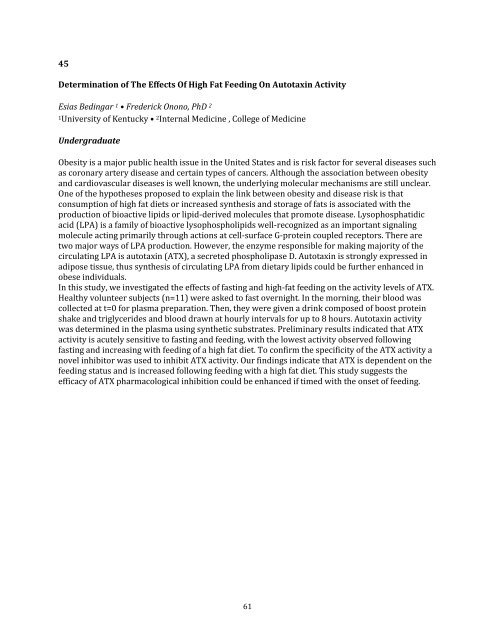2017 Cardiovascular Research Day Abstract Book
Create successful ePaper yourself
Turn your PDF publications into a flip-book with our unique Google optimized e-Paper software.
45<br />
Determination of The Effects Of High Fat Feeding On Autotaxin Activity<br />
Esias Bedingar 1 • Frederick Onono, PhD 2<br />
1University of Kentucky • 2 Internal Medicine , College of Medicine<br />
Undergraduate<br />
Obesity is a major public health issue in the United States and is risk factor for several diseases such<br />
as coronary artery disease and certain types of cancers. Although the association between obesity<br />
and cardiovascular diseases is well known, the underlying molecular mechanisms are still unclear.<br />
One of the hypotheses proposed to explain the link between obesity and disease risk is that<br />
consumption of high fat diets or increased synthesis and storage of fats is associated with the<br />
production of bioactive lipids or lipid-derived molecules that promote disease. Lysophosphatidic<br />
acid (LPA) is a family of bioactive lysophospholipids well-recognized as an important signaling<br />
molecule acting primarily through actions at cell-surface G-protein coupled receptors. There are<br />
two major ways of LPA production. However, the enzyme responsible for making majority of the<br />
circulating LPA is autotaxin (ATX), a secreted phospholipase D. Autotaxin is strongly expressed in<br />
adipose tissue, thus synthesis of circulating LPA from dietary lipids could be further enhanced in<br />
obese individuals.<br />
In this study, we investigated the effects of fasting and high-fat feeding on the activity levels of ATX.<br />
Healthy volunteer subjects (n=11) were asked to fast overnight. In the morning, their blood was<br />
collected at t=0 for plasma preparation. Then, they were given a drink composed of boost protein<br />
shake and triglycerides and blood drawn at hourly intervals for up to 8 hours. Autotaxin activity<br />
was determined in the plasma using synthetic substrates. Preliminary results indicated that ATX<br />
activity is acutely sensitive to fasting and feeding, with the lowest activity observed following<br />
fasting and increasing with feeding of a high fat diet. To confirm the specificity of the ATX activity a<br />
novel inhibitor was used to inhibit ATX activity. Our findings indicate that ATX is dependent on the<br />
feeding status and is increased following feeding with a high fat diet. This study suggests the<br />
efficacy of ATX pharmacological inhibition could be enhanced if timed with the onset of feeding.<br />
61


